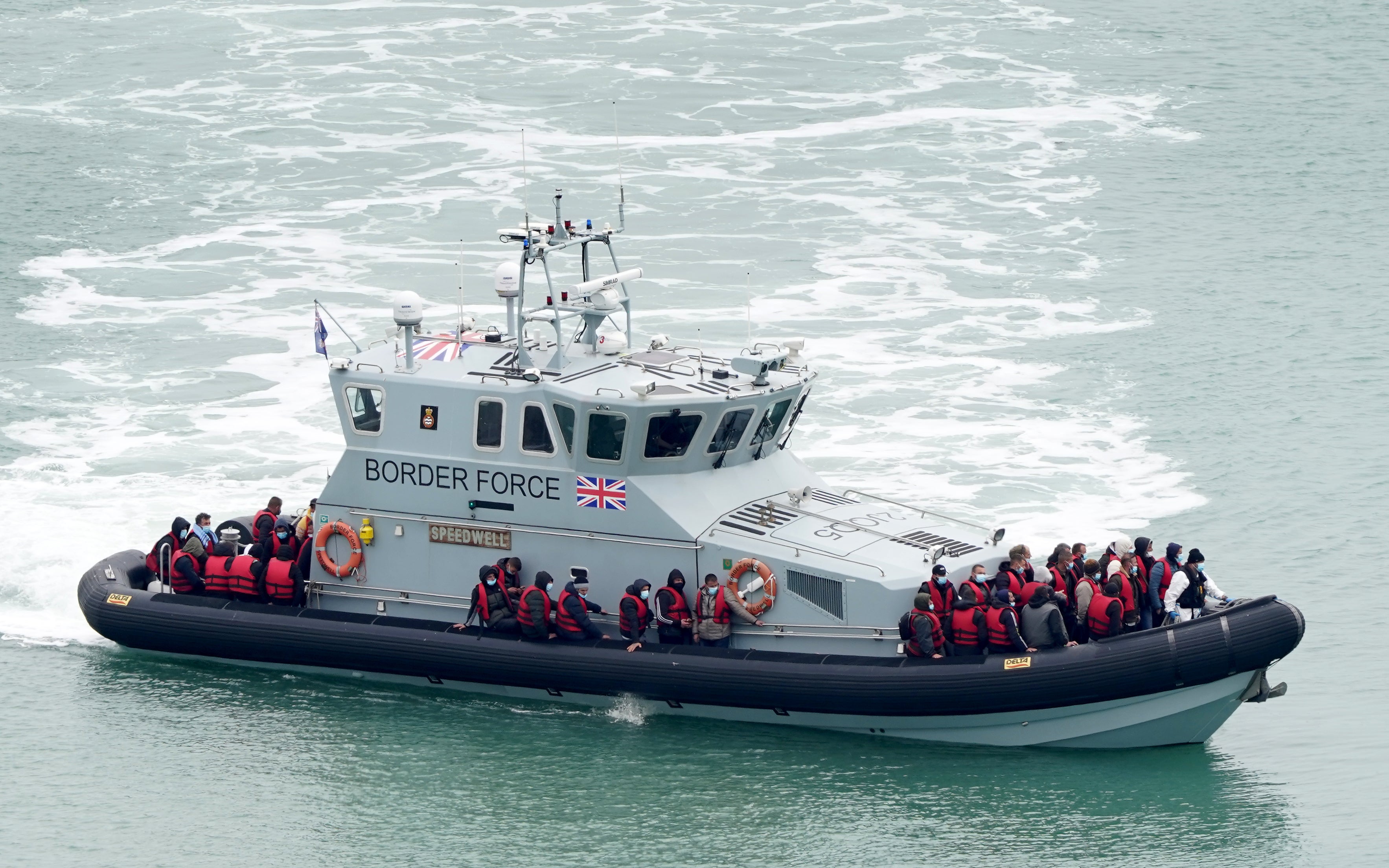Priti Patel may have to approve Channel boat crossing prosecutions because of obscure 1800s law
Draft guidance for prosecutors says a secretary of state must ‘personally’ approve charges for intercepted migrants

Priti Patel may have to personally authorise every prosecution for asylum seekers crossing the Channel in small boats because of an obscure 1800s law.
A new law criminalising migrants who enter British waters “without valid entry clearance” was one of the most controversial parts of the Nationality and Borders Act, which received royal assent last month.
The government said the law would “allow prosecutions of individuals who are intercepted in UK territorial seas and brought into the UK”.
Draft legal guidance for prosecutors, seen by The Independent, says that charges for illegally entering the UK in those circumstances are governed by theTerritorial Waters Jurisdiction Act 1878.
A document put out for consultation says: “Section 4 of the 1878 Act requires that prosecutors obtain consent from ‘one of Her Majesty’s Principal Secretaries of State’ before a prosecution can be instituted for an offence within the jurisdiction of the Admiralty, where the defendant is not a UK citizen. This means a Secretary of State personally.”
The home secretary is expected to be the minister charged with the authorisations.
It comes after The Independent revealed that Ms Patel had been intervening in immigration and asylum cases and going against legal advice, adding to record legal costs from lost cases.
The Home Office is not understood to be seeking the prosecution of every asylum seeker crossing the Channel, but has a policy that refugees should seek protection in the first safe country they reach.
Any asylum seekers who are deemed to have a connection to France or other safe countries, or who lived there temporarily while journeying to the UK, may be declared “inadmissible” for asylum processing in the UK and considered for deportation to Rwanda.
Ms Patel met the Rwandan foreign minister, Vincent Biruta, on Wednesday to discuss “operationalising the agreement” struck in April.
Officials have notified the first group of migrants of its intention to send them to Rwanda but legal challenges are underway and flights have not yet been scheduled.
A Home Office spokesperson said: “We are pursuing every avenue available to end small boat crossings, including by taking tough action against criminal networks who have no regard for people’s health or welfare.
“Those in need of protection should claim asylum in the first safe country they reach and not risk their lives making treacherous journeys.”

The draft Crown Prosecution Service (CPS) guidance lists factors to be taken into account when deciding whether to charge asylum seekers for arriving in small boats.
The document says that refugees will be less likely to be prosecuted if they travel to the UK directly, present themselves to authorities without delay and “show good cause for their illegal entry”.
“In relation to the illegal entry offences, it may be that those refugees, or presumptive refugees, who commit criminal offences as a necessary part of their journey to the UK are not be prosecuted,” the guidance adds.
Under British law, people must be physically present in the UK to claim asylum, but there is no visa for travelling to the country for that purpose and resettlement routes are limited.
Factors that make prosecutions more likely include evidence that people “could have sought asylum in a safe country before beginning the final leg of their journey”, or that they have tried to enter the UK repeatedly or breached deportation orders.
The government has also aimed to make it easier to prosecute migrants for steering boats, after a dozen asylum seekers had their convictions quashed.
The Nationality and Borders Act has changed the law to mean they could be accused of “facilitating” unlawful entry to the UK by piloting a dinghy into British waters, and increased the maximum penalty from 14 years’ imprisonment to life.
The draft CPS guidance says that people who are refugees and have not made money from their role are less likely to be charged, as are migrants who were “acting to safeguard other passengers”.
Factors increasing the likelihood of prosecution include a greater role in organising boat crossings, attempting to avoid immigration controls, endangering life and disrupting travel.
The CPS said it would consider feedback from its consultation on the proposed guidance before finalising it in time for the Nationality and Borders Act to come into force.
Frank Ferguson,the lead for immigration crime, said: “We will prosecute organised gangs profiteering by exploiting illegal routes into the UK whenever our legal test is met.
“Every immigration case referred to us will be carefully considered on the strength of the evidence and whether it is in the public interest to prosecute.
“We have been working hard and collaboratively to ensure that our legal guidance is in the strongest place for when the new laws commence, and we hope that this consultation will help inform the guidance further.”
Join our commenting forum
Join thought-provoking conversations, follow other Independent readers and see their replies
Comments



Bookmark popover
Removed from bookmarks